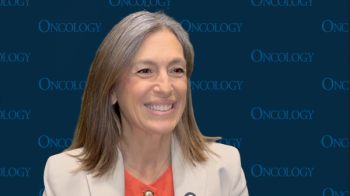
Younger Patients With HER2+ Breast Cancer May Benefit from Surgery First
Those aged 18 to 40 years with invasive, HER2-positive breast cancer showed a survival benefit from upfront surgery over neoadjuvant chemotherapy.
Young patients with HER2-positive breast cancer may experience better survival outcomes, compared with postmenopausal women, regardless of treatment sequence with chemotherapy and surgery. Particularly, those who received surgery first induced a higher overall survival (OS), according to retrospective findings presented at the American Society of Breast Surgeons 25th Annual Meeting.
Investigators evaluated the potential differences in outcomes among young patients (18 to 40 years of age) vs postmenopausal (55 to 65 years of age) with clinically staged cT2 and/or cN1 or larger HER2-positive, invasive, nonmetastatic breast cancer who received neoadjuvant chemotherapy or surgery first. Of the 18,770 patients identified in the National Cancer Database Study, 32% comprised the young cohort and 38% the postmenopausal cohort.
Postmenopausal women demonstrated worse 5-year OS rates, compared with younger patients, regardless of if they received neoadjuvant chemotherapy at 89.8% (95% CI, 89.0%-90.7%) vs 92.9% (95% CI, 92.0%-93.9%), respectively or surgery first at 89.8% (95% CI, 89.1%-90.6%) vs 94.8% (95% CI, 93.9%-95.6%; P < .001).
Further, patients who underwent neoadjuvant chemotherapy followed by mastectomy vs mastectomy first, experienced worse 5-year OS rates (88.7% vs 90.3%, respectively; P < .001), while patients who received neoadjuvant chemotherapy followed by breast conservation had a slight improvement in 5-year OS rates (94.3% vs 92.8%; P < .001).
In an interview with CancerNetwork®, study author Akiko Chiba, MD, FACS, surgical oncologist, Duke University Medical Center, discussed the retrospective study results and their implications in the treatment decision-making process for this younger patient population with HER2-positive breast cancer.
CancerNetwork: Could you elaborate on the unadjusted OS favoring surgery first in young patients, given the previously established benefits of neoadjuvant chemotherapy in achieving pCR for HER2-positive cancers?
Chiba: I think it's difficult to say since the database we're using is retrospective data. There might be selection bias on who went to surgery first, since we typically for the HER2-positive disease, we typically do recommend starting out with neoadjuvant chemotherapy, especially if the tumor is T2 or larger. In the long run, we may see a benefit of neoadjuvant chemotherapy, since the adjuvant therapy has been changing based on the response from chemotherapy. Based on if someone has significant, or any residual disease, they'll be recommended to switch their therapy from trastuzumab [Herceptin] and pertuzumab [Perjeta] to ado-trastuzumab emtansine [T-DM1; Kadcyla], which is more effective.
You mentioned that this was retrospective. Will there be any plans to prospectively review this type of data to confirm what you found?
We currently don't have plan to do prospective data. However, the clinical trial results, such as the KATHERINE trial [NCT01772472], have shown that if someone did receive neoadjuvant chemotherapy and has residual disease and [they] switch to adjuvant therapy, they have better survival, but they're not [being compared with] women who have had surgery first. It is kind of comparing apples to oranges on those clinical trials because everyone underwent chemotherapy first, so it will be hard to tell.
How might neoadjuvant therapy potentially influence the success of breast-conserving surgery for HER2-positive breast cancer?
We do know that if someone does have neoadjuvant chemotherapy, and they have an excellent response, more patients would be candidate for breast conservation rather than mastectomy. What we see is the patient who had breast conservation did have a better overall outcome. That might be related to not that particular surgery, but people who had a mastectomy may have had more extensive disease in the breast that made them choose mastectomy over breast conservation. That is also a limitation since these are retrospective data. We don’t know those granular data.
How might this challenge the traditional approach of prioritizing neoadjuvant chemotherapy for HER2-positive breast cancer in younger women?
It's a challenge to process something that was not an expected result, because we were expecting that people who did receive neoadjuvant therapy would probably do better. But I think what we're seeing might be selection bias.
Considering these findings, how might breast surgeons take this into consideration when trying to talk with their patient about what the best treatment option is?
We also don't want to overtreat the patients. When we give neoadjuvant chemotherapy, we tend to give more agent. For someone who is a borderline candidate for neoadjuvant chemotherapy, it may be best to start out with surgery and have pathologic staging, so that there are more accurate data for the medical oncologist to decide the best treatment plan. The flip side of the story is when you do neoadjuvant chemotherapy, then you get to understand the biology of the cancer and if the tumor had responded to neoadjuvant therapy. That is also very important information in terms of their future recurrence rate.
We know patients should have an active voice in the decision-making process. What advice can you offer to other breast surgeons on how to have this conversation with their patients about the risks and benefits?
Anyone with more locally advanced disease, such as T2 or N1 or more disease for HER2-positive disease, we do strongly recommend starting out with neoadjuvant chemotherapy since we can downstage the disease in the breast and in the axilla. Especially in the axilla, the response rate to neoadjuvant chemotherapy for HER2-positive disease is extremely excellent. Being able to avoid lymph node dissection in the setting would be critical. Therfore, for anyone with node-positive disease, I do recommend neoadjuvant chemotherapy.
If there is no known node-positive disease, and if the tumor is small enough that someone is already a candidate for breast conservation, there may not be a significant benefit. If it's stage T2 or larger, we know that patient will receive adjuvant chemotherapy. You can avoid chemo by doing surgery first, even if you choose mastectomy, which sometimes the patients have a difficult time understanding that. They think if they have bilateral mastectomy that they can spare chemotherapy, which is not accurate information. It's purely based on the biology of the tumor and the stage.
What is on the horizon for breast cancer surgery?
Avoiding surgery for the axilla. We're anxiously waiting for the result of the Alliance A11202 trial [NCT01901094], which [enrolls patients with] clinically positive disease and if they underwent neoadjuvant chemotherapy, they still had small amount of residual disease in the axilla. The trial was to randomize patients to lymph node dissection and radiation or radiation only. If that trial result shows that there was no added benefit to lymph node dissection, we can avoid lymph node dissection, which has significant comorbidity to the patients, such as lymphedema. I'm excited to see those results and avoid bigger surgery that may not have significant benefit to patients.
Reference
May B, Jones T, Thomas S, et al. Comparing outcomes of neoadjuvant chemotherapy versus surgery first in patients with her2-positive breast cancer: a National Cancer Database Study. Presented at: The American Society of Breast Surgeons 25th Annual Meeting; April 10-14, 2024; Orlando, Florida. Abstract 1684746.
Newsletter
Stay up to date on recent advances in the multidisciplinary approach to cancer.



































